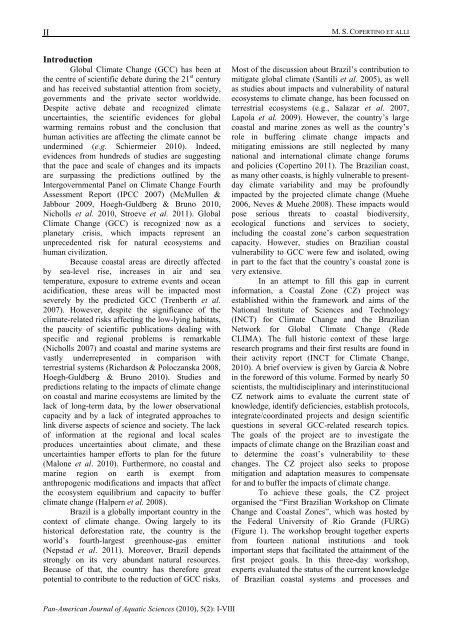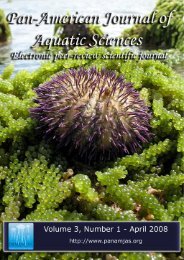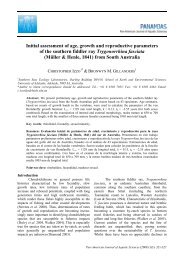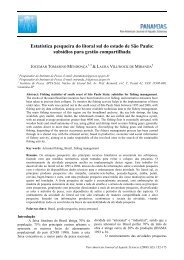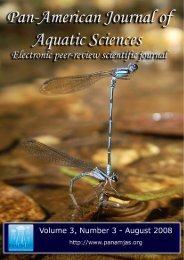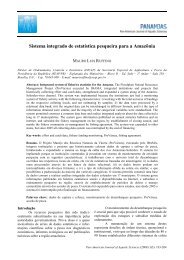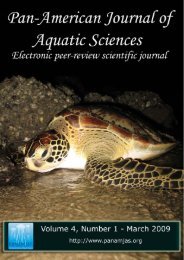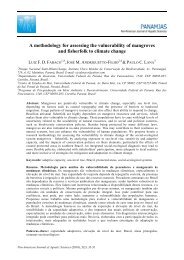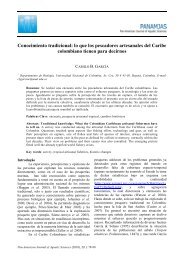Download full issue - PanamJAS
Download full issue - PanamJAS
Download full issue - PanamJAS
- No tags were found...
You also want an ePaper? Increase the reach of your titles
YUMPU automatically turns print PDFs into web optimized ePapers that Google loves.
IIM. S. COPERTINO ET ALLIIntroductionGlobal Climate Change (GCC) has been atthe centre of scientific debate during the 21 st centuryand has received substantial attention from society,governments and the private sector worldwide.Despite active debate and recognized climateuncertainties, the scientific evidences for globalwarming remains robust and the conclusion thathuman activities are affecting the climate cannot beundermined (e.g. Schiermeier 2010). Indeed,evidences from hundreds of studies are suggestingthat the pace and scale of changes and its impactsare surpassing the predictions outlined by theIntergovernmental Panel on Climate Change FourthAssessment Report (IPCC 2007) (McMullen &Jabbour 2009, Hoegh-Guldberg & Bruno 2010,Nicholls et al. 2010, Stroeve et al. 2011). GlobalClimate Change (GCC) is recognized now as aplanetary crisis, which impacts represent anunprecedented risk for natural ecosystems andhuman civilization.Because coastal areas are directly affectedby sea-level rise, increases in air and seatemperature, exposure to extreme events and oceanacidification, these areas will be impacted mostseverely by the predicted GCC (Trenberth et al.2007). However, despite the significance of theclimate-related risks affecting the low-lying habitats,the paucity of scientific publications dealing withspecific and regional problems is remarkable(Nicholls 2007) and coastal and marine systems arevastly underrepresented in comparison withterrestrial systems (Richardson & Poloczanska 2008,Hoegh-Guldberg & Bruno 2010). Studies andpredictions relating to the impacts of climate changeon coastal and marine ecosystems are limited by thelack of long-term data, by the lower observationalcapacity and by a lack of integrated approaches tolink diverse aspects of science and society. The lackof information at the regional and local scalesproduces uncertainties about climate, and theseuncertainties hamper efforts to plan for the future(Malone et al. 2010). Furthermore, no coastal andmarine region on earth is exempt fromanthropogenic modifications and impacts that affectthe ecosystem equilibrium and capacity to bufferclimate change (Halpern et al. 2008).Brazil is a globally important country in thecontext of climate change. Owing largely to itshistorical deforestation rate, the country is theworld’s fourth-largest greenhouse-gas emitter(Nepstad et al. 2011). Moreover, Brazil dependsstrongly on its very abundant natural resources.Because of that, the country has therefore greatpotential to contribute to the reduction of GCC risks.Most of the discussion about Brazil’s contribution tomitigate global climate (Santili et al. 2005), as wellas studies about impacts and vulnerability of naturalecosystems to climate change, has been focussed onterrestrial ecosystems (e.g., Salazar et al. 2007,Lapola et al. 2009). However, the country’s largecoastal and marine zones as well as the country’srole in buffering climate change impacts andmitigating emissions are still neglected by manynational and international climate change forumsand policies (Copertino 2011). The Brazilian coast,as many other coasts, is highly vulnerable to presentdayclimate variability and may be profoundlyimpacted by the projected climate change (Muehe2006, Neves & Muehe 2008). These impacts wouldpose serious threats to coastal biodiversity,ecological functions and services to society,including the coastal zone’s carbon sequestrationcapacity. However, studies on Brazilian coastalvulnerability to GCC were few and isolated, owingin part to the fact that the country’s coastal zone isvery extensive.In an attempt to fill this gap in currentinformation, a Coastal Zone (CZ) project wasestablished within the framework and aims of theNational Institute of Sciences and Technology(INCT) for Climate Change and the BrazilianNetwork for Global Climate Change (RedeCLIMA). The <strong>full</strong> historic context of these largeresearch programs and their first results are found intheir activity report (INCT for Climate Change,2010). A brief overview is given by Garcia & Nobrein the foreword of this volume. Formed by nearly 50scientists, the multidisciplinary and interinstitucionalCZ network aims to evaluate the current state ofknowledge, identify deficiencies, establish protocols,integrate/coordinated projects and design scientificquestions in several GCC-related research topics.The goals of the project are to investigate theimpacts of climate change on the Brazilian coast andto determine the coast’s vulnerability to thesechanges. The CZ project also seeks to proposemitigation and adaptation measures to compensatefor and to buffer the impacts of climate change.To achieve these goals, the CZ projectorganised the “First Brazilian Workshop on ClimateChange and Coastal Zones”, which was hosted bythe Federal University of Rio Grande (FURG)(Figure 1). The workshop brought together expertsfrom fourteen national institutions and tookimportant steps that facilitated the attainment of thefirst project goals. In this three-day workshop,experts evaluated the status of the current knowledgeof Brazilian coastal systems and processes andPan-American Journal of Aquatic Sciences (2010), 5(2): I-VIII


